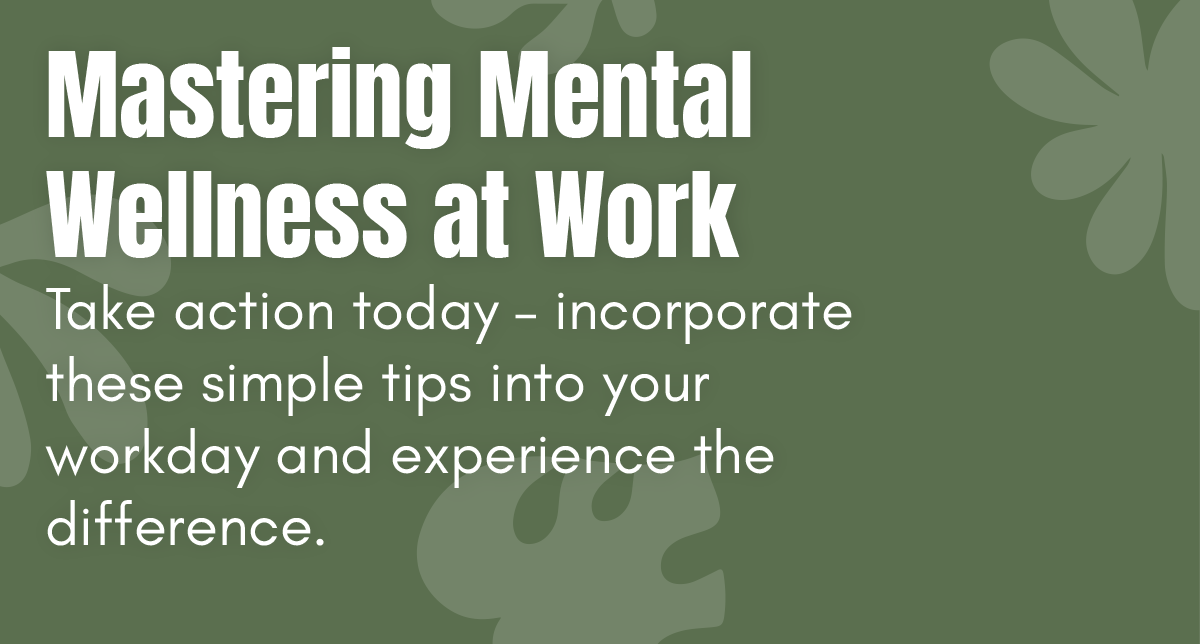In the fast-paced world of deadlines and deliverables, managing mental health in the workplace is as crucial as managing tasks. For the working class, mental well-being often takes a backseat amidst the hustle and bustle. Together, let’s focus on practical strategies that can help maintain mental health at work, ensuring that you not only survive but thrive in your professional environment. From setting boundaries to creating mindful moments, you’ll discover actionable tips to enhance your mental well-being.
Start with the Basics
Stay Active
Incorporating physical activity into your workday can significantly boost your mental health. Short walks or stretches during breaks can rejuvenate your mind and body. Consider a brisk walk around your office building or even a quick yoga session to release tension. These brief moments of activity not only improve circulation but also help clear your mind, preparing you to tackle tasks with renewed energy. Remember, you don’t need to commit to an hour-long workout to reap the benefits. Just five to ten minutes of movement can make a difference. It’s about consistency rather than intensity, so find activities that you enjoy and sprinkle them throughout your day for optimal results. Finally, encourage your colleagues to join you for a walk or stretch. This can foster a sense of community and create a supportive environment where everyone prioritises their mental and physical well-being.
Hydrate and Nourish
Keeping hydrated and well-nourished is essential for maintaining energy levels and staying focused. Begin by keeping a water bottle at your desk to remind yourself to drink regularly. Proper hydration helps maintain cognitive function, so you’re sharper and more alert throughout the day. In addition to hydration, stocking your workspace with healthy snacks like nuts, fruit, or yoghurt can prevent energy dips and keep your brain fuelled. Avoid relying on sugary snacks or excessive caffeine, as they can lead to crashes and negatively impact your mood. Taking a few moments to enjoy a nutritious snack can also serve as a mini-break, giving you time to pause, reflect, and recharge. Such simple practices help establish a foundation of mental and physical well-being in the workplace.
Create Boundaries
Set Work Hours
Establishing clear work hours is vital to prevent burnout and maintain mental health. Define specific start and stop times for your workday, and stick to them. This separation helps delineate work from personal life, allowing you to unwind and recharge once you’ve clocked out. Communicate your working hours to colleagues and supervisors, ensuring everyone respects your boundaries. By setting expectations, you can protect your personal time and minimise the risk of work encroaching on your downtime. Creating a balanced schedule that includes breaks and a definitive end to the workday helps maintain well-being and productivity. When you’re off the clock, use that time to engage in activities that bring you joy and relaxation.
Say ‘No’ When Needed
Learning to say ‘no’ is a powerful skill in safeguarding your mental well-being. It’s important to recognise your limits and not overcommit yourself. Politely declining additional tasks when you’re already stretched thin can prevent stress and burnout. Practice assertiveness by communicating your workload honestly with colleagues and supervisors. They are more likely to appreciate your transparency and support your decision to prioritise quality over quantity. Remember, saying ‘no’ doesn’t mean you’re not a team player. It means you’re taking responsibility for your mental health and ensuring you can deliver your best work without compromising your well-being.
Communicate and Connect
Check-In with Colleagues
Fostering supportive conversations with team members can significantly impact your mental health. Regular check-ins with colleagues create a sense of camaraderie, offering an opportunity to share experiences, challenges, and triumphs. Building these connections can help alleviate feelings of isolation and stress. Whether it’s a quick chat over coffee or a more in-depth discussion during lunch breaks, these interactions provide emotional support and strengthen workplace relationships. By cultivating a supportive network, you’re also contributing to a positive work culture where everyone feels valued and heard. This sense of belonging enhances overall well-being and job satisfaction.
Seek Support
Don’t hesitate to reach out to HR or mental health resources if you’re feeling overwhelmed. Many workplaces offer employee assistance programs (EAPs) that provide confidential support for personal and work-related issues. Familiarise yourself with the mental health resources available in your organisation. Whether it’s speaking to a counsellor, attending workshops, or accessing online materials, these resources can offer guidance and support during challenging times. Taking proactive steps to seek support demonstrates strength and self-awareness. Remember, you’re not alone, and there are professionals ready to help you manage your mental health effectively.
Mindful Moments
Practice Deep Breathing
Taking five minutes for deep breathing or meditation can work wonders for your mental health. These mindful moments help reduce stress, improve focus, and increase emotional resilience. Find a quiet space in your office or step outside for a few minutes. Close your eyes, take slow, deep breaths, and focus on the present moment. This practice can calm your mind and create a sense of inner peace. Incorporating deep breathing into your daily routine can help you manage stress more effectively. Over time, you’ll develop a greater sense of self-awareness and a stronger ability to handle workplace challenges.
Unplug…Really Unplug
Regularly stepping away from your screen is essential for mental refreshment. Prolonged exposure to digital devices can lead to eye strain, fatigue, and decreased concentration. Set aside time each day to unplug from technology and engage in activities that bring you joy. Whether it’s reading a book, going for a walk, or practising a hobby, these moments allow your brain to rest and recharge. Creating a balance between screen time and offline activities helps maintain mental clarity and well-being. You’ll return to work with a fresh perspective and renewed energy.
Balance Work and Rest
Prioritise Sleep
Getting 7-8 hours of quality sleep each night is crucial for recharging your mind and body. Consistent, restful sleep enhances cognitive function, mood, and overall health. Establish a calming bedtime routine to signal to your body that it’s time to wind down. Avoid screens, caffeine, and heavy meals before sleep. Instead, opt for relaxing activities like reading or meditating. Prioritising sleep creates a strong foundation for mental well-being. When you’re well-rested, you’re better equipped to handle workplace stressors and maintain a positive outlook.
Schedule Downtime
Planning activities that make you feel relaxed and recharged is essential for maintaining mental health. Whether it’s spending time with loved ones, engaging in hobbies, or exploring nature, these moments of downtime help you disconnect from work-related stress. Consider scheduling regular breaks throughout the day to reset and recharge. Whether it’s a quick walk, a coffee break, or a few minutes of stretching, these pauses can boost your mood and productivity. By intentionally prioritising downtime, you create a work-life balance that supports your mental health. Remember, taking care of yourself ultimately leads to greater overall success and well-being.
Mind Over Work Woes
Managing mental health in the workplace is an ongoing process that requires mindfulness and dedication. By incorporating the strategies outlined above, you can create a work environment that supports your well-being and fosters productivity. Remember, your mental health is a priority, and small changes can lead to significant improvements. For further resources and support, consider reaching out to Tafara Wellness Initiative, where you can be connected to mental health professionals or explore online materials that provide guidance on maintaining mental wellness at work. Invest in yourself and your mental health—it’s a worthwhile endeavour that will benefit you both personally and professionally.





